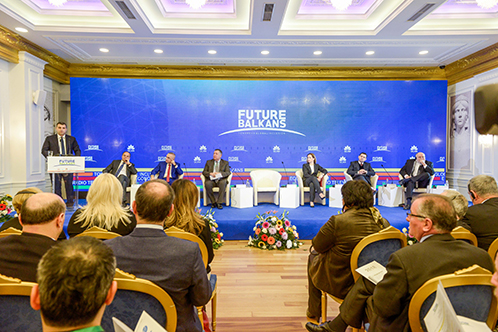BANK OF ALBANIA
PRESS RELEASE
Governor Sejko: Speech at the Tirana Economic Forum - ''Future Balkans: Towards a global inclusion'' Leadership, Institutions and Policies Convergence 2017-2020
Publication date: 24.01.2018
Your Excellency Mr President,
Your Excellency Deputy Prime Minister of Albania,
Your Excellency Deputy Prime Minister of Kosovo,
Honourable Minister of Finance and Economy,
My fellow Colleagues and Honourable Participants,
It is a pleasure for me to participate at this Conference, convened to discuss on the importance of regional integration, which should be promoted by a forward-looking leadership and supported by the policies convergence.
I believe that the dialogue that focuses on sharing our vision for the future, the convergence of perspectives about the challenges ahead of us, and identifying the objectives and drafting agendas for joint action, will be a fruitful dialogue to all of us. Policy convergence, both within and between countries, promotes efficiency and minimizes negative spill-overs.

The role of institutions in the growth and development
Institutions are the backbone of any modern society, in as much as they generate and implement laws, regulations and policies of development, thus laying out the rules of the game in a market economy. From a broader perspective, these rules should provide for a stable and transparent environment, thus enabling a predictable and long-term decision-making process. They should promote fair competition and equality of opportunities, and they should engender fairness and social cohesion.
It is clear that richer economies and stable societies tend to have stronger and more stable institutions.
It is, therefore, my belief that our region should not subscribe to an ‘organic model’ of institutional growth. By ‘organic’, I mean a growth model where institutions catch up to economic development, and tend more to ensure a certain level of prosperity rather than instigate it.
To the contrary, I believe institutions and policies should lead the growth and development processes. In this context, our task as policy makers is to define goals, to identify impediments, and to undertake the required countermeasures. This, in essence, is the role of leadership.

Let me illustrate my point with just a few examples of the challenges facing us as a region:
- First, problems with the business environment, including corruption and informality, rank high on the list of growth impediments, both in Albania and in the region.
- Second, our economic and financial stability should be further enhanced, in order to increase our resilience to shocks and to decrease our financing costs.
- Third, it is becoming increasingly clear that our financial systems have become over-reliant on banks. Looking ahead, we should rely more on capital markets in order to finance domestic growth.
- Fourth, a common complaint frequently heard from potential foreign investors is the limited attractiveness of small and fragmented markets. While partly incorrect, we should do more to increase our trade and infrastructure integration.
- Fifth, in competing for the same pool of international investors, countries in the region often attempt to raise their individual profile through offering tax break or other subsidies. This race to the bottom does not prove to be productive.
Resolving any of these issues requires foresight, strong institutions, determined policy action, and regional coordination.

Institutions and integration
Our region is actively involved in the EU integration process. This objective is the lighthouse for our institutional reform efforts and has produced notable benefits. The EU integration is aiding authorities in the region to anchor their institutional reforms and policies. On the other hand, the EU institutions provide oversight and lend credibility to the process. Additionally, since individual countries are working towards common objectives, regional policy is better coordinated.
However, I also believe countries in the region could do more to share their experiences and learn from each other. Albania offers a positive example in terms of economic and financial stability. Macedonia has done exceptionally well in terms of attracting high-value-added FDIs. Serbia is on the regional vanguard of financial market development. All of us should learn from our individual success stories; all of us should avoid mistakes we have individually made in the past. Our countries share more commonalities than differences: what works for one is more likely than not to work for others, and vice versa.
Furthermore, I believe we should look at regional integration as a goal in itself, rather than as an instrument to EU integration. Joint EU integration would supersede certain regional integration frameworks, such as trade and factor mobility, but it would not supplant the need for further policy dialogue and common regional perspectives and solutions.
Let me now to briefly describe the role of institutions in structural reforms in Albania.
Institutions and structural reforms in Albania
It is virtually impossible to do justice to the breadth and depth of reforms in Albania over the limited allotted time. Therefore, I will try to highlight only its main items.
- In order to improve our business environment, the Albanian authorities have engaged in comprehensive reforms of the property rights, of the tax regime, of the electricity sector, of the general infrastructure, and remain engaged in the fight against informality. The most recent measure in this regard is a banking sector regulation that aims to put an end to the practice of lending through uncertified company balance sheets. Further, to enhance efficiency and tackle corruption and informality, a determined drive to improve the functioning of the public administration, which broadly speaking encompasses also the judicial system reform, has been undertaken.
- In order to increase economic stability and to improve financial resilience, we have initiated a wide ranging set of reforms. To that end, the Government has improved its public finance management procedures, has adopted a fiscal responsibility framework, and has undertaken measures to reduce debt. The Bank of Albania has strived to model itself after the ECB. Its professionalism has increased while its independence, transparency and credibility have all improved. Through a joint effort of institutional stakeholders, we have managed to reform the Financial Supervisory Authority and enhance the role of the Deposit Insurance Authority. Together with the Albanian government, we have implemented a comprehensive NPL resolution strategy, which has already brought encouraging results, we have approved a Bank Resolution Law and we have jointly designed a de-euroization strategy, aimed at tackling financial vulnerabilities, improving the transmission mechanism and intensifying the use of the domestic currency. We have also established a new inter-institutional Financial Stability Advisory Group, vested with coordination powers on systemically-important stability–related issues.
- In order to further develop financial markets, the Albanian authorities have accelerated the development of capital markets, through the establishment of the Albanian Stock Exchange, the licensing and functioning of several investment and asset management funds, the encouragement of the on-going consolidation in the bank and non-bank financial institutions, the tax encouragement of private pension schemes, the on-going efforts to improve the functioning of secondary markets for government papers, etc.
However, I am convinced the sharing regional experience would result in an additional impetus to the process. Furthermore, regional solutions can be sought to common problems.
This brings me to my last point.
Improving regional cooperation
Coordination and cooperation cannot run standalone in an ever integrated and intertwined world. The same concept applies to our region, where policy initiatives, aimed at achieving a common objective, should be implemented jointly.
Let me highlight a few potential cooperation areas:
First, I believe there is scope for greater regional dialogue and greater policy convergence, at all relevant areas of public policy and private sector development.
Second, I believe there is more to be done in order to finish the job of regional integration. In particular, standards on products and services should be agreed upon.
Third, beyond the convergence of financial development policies, I remain convinced we should explore the idea of joint financial development projects. Although fraught with difficulties, a regional stock exchange is a meaningful potential project.
Fourth, I believe the region should strive towards establishing the lowest acceptable common denominator in terms of tax, labour market, financial sector, and environment regulation. ‘Beggar-thy-neighbour’ policies through constantly undercutting each other in any of these areas are only damaging the region in the long term.
Fifth, the regional infrastructure remains rather fragmented. This refers not merely to the transport infrastructure, but also the electricity and IT network.
Honourable participants,
Some of the issues I professed here might seem utopian or unrealistic. However, I remain convinced that through an honest common endeavour, such ideas might, someday, in the not-too-distant future, become reality.
Thank you!

 Twitter
Twitter
 Youtube
Youtube
 Facebook
Facebook
 Flickr
Flickr
 RSS
RSS
 Subscribe
Subscribe
 Feedback
Feedback